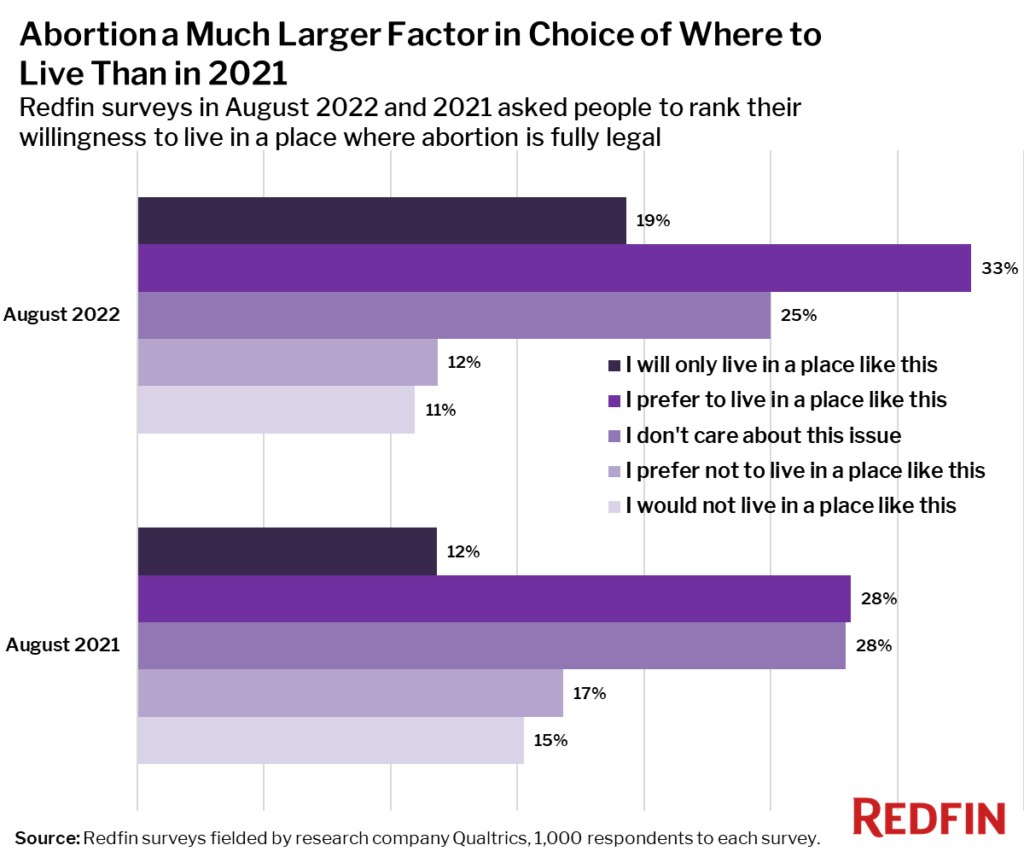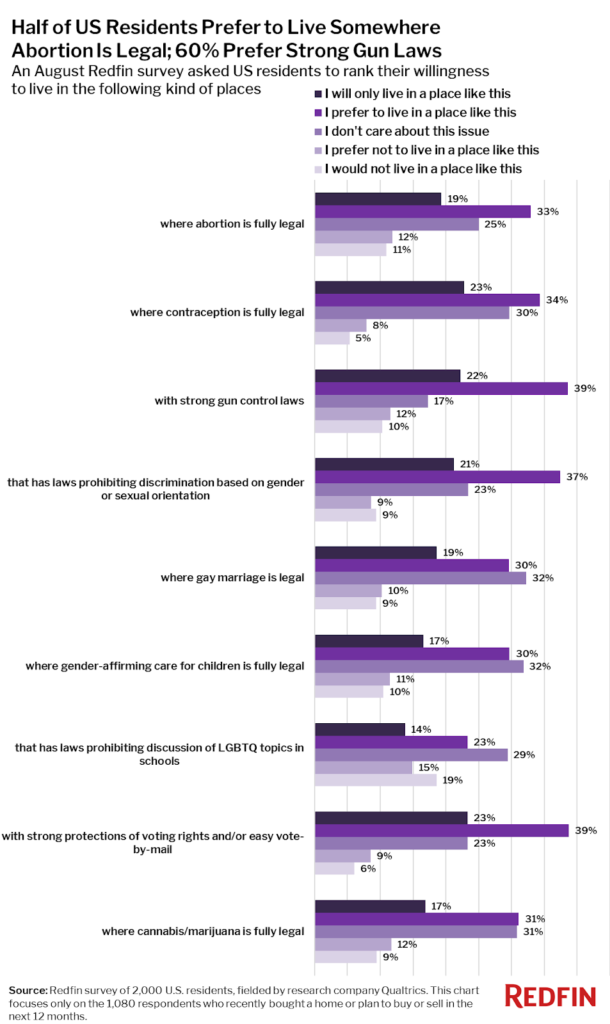A recent Redfin survey found that most homebuyers and sellers would prefer living in a place where abortion is legal, up significantly from before the Supreme Court overturned Roe v. Wade. The survey also found that more than 60% of homebuyers and sellers want to live somewhere with strong gun control laws and one-third prefer to live in a place that allows classroom discussion of LGBTQ topics.
One in five (19%) homebuyers and sellers would only live in a place where abortion is fully legal, up significantly from 12% last year, before the Supreme Court overturned Roe v. Wade and gave states the power to ban abortions. An additional 33% would prefer to live in a place where abortion is fully legal, up from 28% last year.
On the flip side, 11% would definitely not live in a place where abortion is legal, down from 15% a year earlier. An additional 12% would prefer not to live in such a place, down from 17% a year earlier.

That’s according to a national Redfin-commissioned survey of about 1,000 U.S. residents who recently bought a home or plan to buy or sell a home in the next year, fielded in August 2022. It’s compared with a Redfin survey fielded in August 2021; the 1,000 respondents to that survey moved in the 18 months prior to taking the survey. The results reported here are from a question asking homebuyers and sellers to rank their willingness to live in a place with certain state or local laws on certain political issues.
The U.S. Supreme Court’s June ruling to overturn Roe v. Wade means the legality of abortions now differs from state to state. With the ruling, states have the power to ban abortions after half a century during which women had a constitutional right to abortion. So far, at least 12 states have banned most abortions.
For a lot of Americans, the overturning of Roe v. Wade means the decision about where to live is even more important than it used to be. Last year, the legality of abortion was a less pressing issue for most Americans as abortion was legal in every U.S. state except Texas, which enacted an abortion ban in summer 2021.
“A lot of homebuyers are moving to Arizona because they like the politics here and/or don’t like the politics where they’re coming from,” said Heather Mahmood-Corley, a Redfin agent in Phoenix, a perennial favorite migration destination for homebuyers. While the state voted for Joe Biden in 2020’s presidential election, it is generally more conservative than California and Washington, where a large portion of incoming homebuyers hail from.
Sixteen percent of respondents to the August 2022 survey said state or local abortion laws are an important factor in deciding where to live, and 1% said they’re the most important factor. The most commonly cited factors in deciding where to live are cost of living (59% said it’s among the important factors; respondents could select more than one factor), crime/safety (53%) and home affordability (51%).
Other political issues also factor into where American homebuyers and sellers want to live, including state and local gun control laws, voting protections and LGBTQ rights.
Americans deciding to live based on state and local politics could lead to a more divided country, with people choosing to live in areas where people have similar political views. Relocating to a different state based on personal preferences is also more realistic than it once was: A record share of homebuyers are looking to move from one part of the country to another, largely thanks to remote work.
More than one in five (22%) homebuyers and sellers would only live in a place with strong gun control laws, and an additional 39% would prefer to live in such a place. Overall, that’s nearly triple the 10% who would not live in a place with strong gun-control laws and 12% who would prefer not to.

The survey data in this section and each of the following sections is based on the same August 2022 Redfin-commissioned survey mentioned above.
Gun control has been in the spotlight as mass shootings and gun violence have risen over the last few years. Though there is federal gun-control legislation, some states, including California, New York and Illinois, passed stronger laws this year. State and local gun laws impact some Americans’ decision on where to live because some people advocate for gun-control measures, believing they save lives, others advocate for the right to bear arms.
Respondents were more likely to cite gun-safety laws as an important factor in where they live than abortion laws. About one in five (21%) said state or local gun-safety laws are an important factor in choosing where to live, while 3% said they’re the most important factor.
More than half (58%) of respondents prefer to live in a place with laws prohibiting discrimination based on gender or sexual orientation. That’s compared with 18% who prefer not to live in a place with such laws.
Nearly half (47%) prefer to live in a place where gender-affirming care for children is fully legal. That’s more than double the 21% who prefer not to live in such a place. Gender-affirming care encompasses a range of medical interventions designed to support an individual’s gender identity, including counseling and medications.
Relatedly, about one-third (34%) prefer to live somewhere that allows classroom discussion of LGBTQ topics. Just a slightly larger share (37%) take the opposite stance, preferring to live in a place that prohibits classroom discussion of LGBTQ topics.
Gender-affirming care for children and classroom discussion of LGBTQ topics have both been hotly debated political issues this year. A Texas directive for its department of family services to investigate families providing their transgender children with gender-affirming care as potential child abuse is in legal limbo. Some families with transgender children have chosen to leave Texas.
And more than a dozen states have introduced legislation like Florida’s recently enacted House Bill 1557, which prohibits classroom discussion on sexual orientation or gender identity in kindergarten through third grade and blocks discussion for older students unless it’s “age appropriate or developmentally appropriate.”
“My husband and I moved from Tallahassee, FL to Seattle in 2017 partly because Florida’s state government was on a path to undermining protections for LGBTQ people, and we didn’t feel comfortable there outside our close circle of friends,” said Dustin Hand, a Senior Systems Administrator at Redfin. “Living in a state where the laws don’t protect you is alienating and stressful. When I went places in Florida, I typically waited for a person or business to explicitly say ‘it’s safe here’ before opening up about who I am and whom I love. Florida’s recent legislation takes an active stance against teaching people about my community and affirms my decision to live in a place where I feel protected being my authentic self.”
Fifteen percent of respondents said LGBTQ rights are an important factor in choosing where to live, a similar share that feel abortion laws are important. Three percent said LGBTQ rights are the most important factor.
Nearly two-thirds (62%) of homebuyers and sellers would prefer living somewhere with strong voting-rights protections and/or easy vote-by-mail. Fifteen percent prefer not to live in such a place.
Laws about voting rights have also been at the forefront of politics in recent years. The Supreme Court upheld an Arizona ban on ballot collection last year, a controversial decision that went against the 1965 Voting Rights Act. Since then, at least 17 states have passed laws making it more difficult to vote.
Fourteen percent of respondents said voting rights are important in choosing where to live, while 1% said they’re the most important factor.
About half (48%) of respondents would prefer living in a place where marijuana is legal, compared with 21% who would prefer not to live in such a place.
Recreational marijuana is legal in 19 states and Washington, D.C., and it’s on the ballot this year in a handful of others.
Fifteen percent said state or local marijuana laws are important in choosing where to live, and 1% said they’re the most important factor.
Editor’s note: An earlier version of this report misstated the percentage of U.S. homebuyers and sellers who want to live somewhere with legal abortion. 52% of homebuyers and sellers would prefer to live somewhere with legal abortion.


